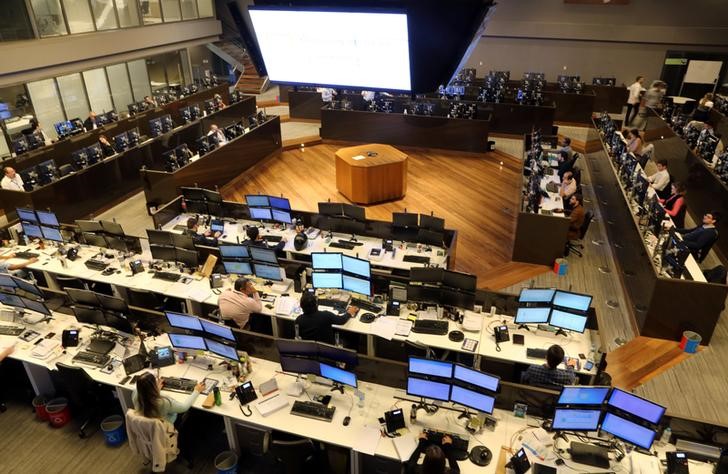By Brad Haynes and Bruno Federowski
SAO PAULO (Reuters) - Falling debt costs and a steadier Brazilian currency bolstered some companies' third-quarter earnings but the results disappointed hopes for signs of a recovery in the country's recession-bound economy.
Brazil's benchmark Bovespa stock index (BVSP) has rallied nearly 40 percent in 2016, despite the worst recession since the 1930s, as investors welcomed a new center-right government's agenda of fiscal reforms and readied for an economic rebound.
While renewed investor confidence has brought down many Brazilian firms' financing costs, helping them turn a profit, the earnings season wrapping up this week showed little evidence that surging confidence has translated into more economic activity.
Revenue at three-quarters of the non-financial companies on the Bovespa index failed to keep pace with annual inflation, according to a Reuters analysis of securities filings.
About half the companies posted stronger net income, helped in most cases by easing financial expenses due to cheaper hedging, lower borrowing costs and cash from asset sales.
The election of Donald Trump as the next U.S. president has thrown into doubt the financial tailwinds that provided a silver lining in recent earnings.
Brazil's currency
If those expectations are confirmed, Brazilian companies may not be able to rely so much on cheaper debt and easier hedging.
"The turnaround until now has been really influenced by the currency and lower financing costs," said Andrew Campbell, head of equity strategy at Credit Suisse (SIX:CSGN). "But to have a more sustainable trend or establish a full recovery requires contributions from more domestic sectors."
Cheaper borrowing helped electric utilities such as EDP Energias do Brasil (SA:ENBR3) and toll road operators including Ecorodovias Infraestrutura e Logistica SA (SA:ECOR3) more than double their net income despite stagnant demand last quarter.
Commodity exporters from wood pulp producer Fibria Celulose SA (SA:FIBR3) to iron ore miner Vale SA (SA:VALE5) also swung to profit in the third quarter from net losses a year ago, as a steady exchange rate kept a lid on the cost of foreign debts.
WEAK DOMESTIC DEMAND
With the economy still weak, third-quarter revenue at companies covered by analysts at Banco BTG Pactual SA, excluding Petrobras and Vale, was 0.4 lower than average analyst expectations.
Net income, thanks in part to lower financial costs, came in 6.7 percent above estimates, according to a report.
For sectors more sensitive to consumer demand, however, cheaper debt was not enough to offset the ongoing slump.
Retail giant GPA SA (SA:PCAR4) more than doubled its loss from a year ago as it relied on deeper discounts to draw traffic to supermarkets. Lojas Renner SA (SA:LREN3), the star performer among Brazil's apparel chains in recent years, reported its first annual decline in comparable sales figures since 2009.
Meat processors BRF SA (SA:BRFS3) and JBS SA (SA:JBSS3) both posted huge drops in net income, while drinks giant Ambev SA (SA:ABEV3) scrapped a target of flat Brazilian sales this year.
Telecommunications companies laid plans to carry a painful turnaround forward, with TIM Participações SA (SA:TIMP3) laying off staff and Telefonica (MC:TEF) Brasil SA (SA:VIVT4) cutting its target for capital spending as both struggled with weak demand.
Lower capital spending cut across sectors, with struggling firms from cosmetics maker Natura SA (SA:NATU3) to steelmaker Gerdau SA (SA:GGBR4) dialing back investment as caution overrides hopes for a swift rebound.
To be sure, falling inflation is expected to spur a string of interest rate cuts by Brazil's central bank next year, which should spur consumer demand and encourage more corporate investment. Recent refinancing and paying down of debt also leaves room for an eventual resurgence of capital spending.
Yet the short-term outlook remains challenging, even for the industrial firms expected to benefit first from the investment-led recovery that economists are forecasting.
Electric motor maker WEG SA (SA:WEGE3), for instance, reported slipping sales and net profit in the third quarter. The company cut investment in the quarter to a five-year low and gave up on its 2016 capital spending target.

"There are reasons for cautious optimism, but in practice there has still been no change," WEG executive Andre Luis Rodrigues told analysts on an earnings call.